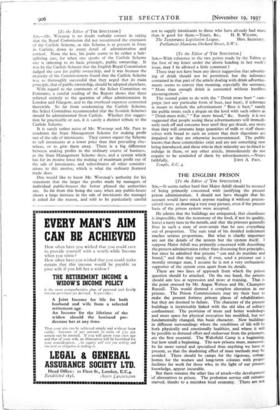THE ENGLISH PRISON [To the Editor of THE SPECTATOR.] SIR,—It
seems rather hard that Major Athill should be accused of being primarily concerned with justifying the present prison administration. I should not have thought that his account would have struck anyone reading it without precon- ceived views as'drawing a very rosy picture, even if the present basis of the prison system were accepted.
He admits that the buildings are antiquated, that cleanliness is impossible, that the monotony of the food, if not its quality, leaves a nasty taste in the mouth, and that the prisoner generally lives in such a state of over-strain that he sees everything out of proportion. The sum total of his detailed indictment reaches serious proportions. But what is • chiefly important are not the details of the system but the system itself. I suppose Major Athill was primarily concerned with describing the present administration rather than discussing first principles, but since he admitted that prisons " can and do mutilate and brand," and that they rarely, if ever, send a prisoner out a morally stronger man, I assume he is not a very enthusiastic supporter of the system even apart from its details.
There are two lines of approach from which the prison
question should be attacked. On the one hand, the prisons should aim less at repression and more at training. That is the point stressed by Mr. Angus Watson and Mr. Champion Russell. This would demand a complete alteration in our prisons. The Prison Commissioners may try their best to make the present fortress prisons places of rehabilitation, but they are doomed to failure. The character of the present buildings is inextricably linked with the old idea of solitary confinement. The provision of- more and better workshops and more space for physical recreation has modified, but not fundamentally changed, this basic character. New buildings in different surroundings where the conditions of life will be both physically and emotionally healthier, and where it will be possible to demand effort and endeavour from the prisoners, are the first essential. The Wakefield Camp is a beginning, but how small a beginning. The- new prisons must, moreover, be far more varied and specialised than anything we have at present, so that the deadening effect of mass methodi may be avoided. There should be camps for the vigorous, cottage homes for the women and long-term colonies with proper facilities for work for those who, in the light of- our present knowledge, appear incurable.
, But there remains the other line of attack—the development of alternatives to prison. The probation service still remains starved, thanks to a mistaken local economy. There are not
a score of probation hostels in the country, though these provide the proper substitute for prisons for those who cannot safely be left in the old surroundings but need not be deprived of their freedom. The provision of facilities for physical and psychological examination and treatment is only in its infancy. The aim of the penal system should _always be the re-adaptation of the offender to the life of society, leaving him to live in society wherever this is possible. But even where this is not possible he should still be regarded as an individual, with individual problems to be met, ,not merely as an offender to be forced into a mould and made to conform to a soul-destroying routinc.—I am, Sir, yours, &c., The Howard League for Penal Reform, W. A. ELKIN, Parliament Mansions, Hon. Press Secretary. Orchard Street, London, S .11'• .1.

















































































































 Previous page
Previous page